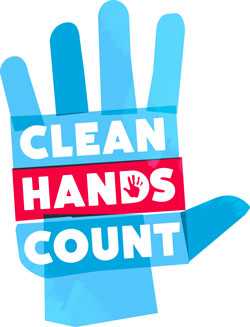Patients
 Clean Hands Count for Patients
Clean Hands Count for Patients
As a patient in a healthcare setting, you are at risk of getting an infection while you are being treated for something else. Patients and their loved ones can play a role in asking and reminding healthcare providers to clean their hands. Your hands can spread germs too, so protect yourself by cleaning your hands often.
Hand Hygiene: 5 Facts
FACT
On average, healthcare providers clean their hands less than half of the times they should.
- This can put you at risk for a serious infection. It’s okay to ask them questions like, “Before you start the exam, would you mind cleaning your hands again?” or “Would it be alright if you cleaned your hands before changing my bandages?”
FACT
Alcohol-based hand sanitizer kills most of the bad germs that make you sick.
- Your hands have good germs on them that your body needs to stay healthy. Your hands can also have bad germs on them that make you sick. Alcohol-based hand sanitizers kill the good and bad germs, but the good germs quickly come back on your hands.
FACT
Alcohol-based hand sanitizer does not kill C. difficile.
- Clostridium difficile or “C.diff” is a common healthcare-associated infection that causes severe diarrhea. If you have a C. difficile infection, make sure your healthcare providers wear gloves to examine you. You and your loved ones should wash your hands with soap and water to prevent the spread of C. difficile.
FACT
Alcohol-based hand sanitizer does not create antibiotic-resistant superbugs.
- Alcohol-based hand sanitizers kill germs quickly and in a different way than antibiotics. Using alcohol-based hand sanitizers to clean your hands does not cause antibiotic resistance.
FACT
Your hands can spread germs too.
- Make sure you and your visitors are cleaning your hands as well.
When should you clean your hands?
- Before preparing or eating food
- Before touching your eyes, nose, or mouth
- Before and after changing wound dressings or bandages
- After using the restroom
- After blowing your nose, coughing, or sneezing
- After touching hospital surfaces such as bed rails, bedside tables, doorknobs, remote controls, or the phone
How should you clean your hands?
With an alcohol-based hand sanitizer:
- Put product on hands and rub hands together
- Cover all surfaces until hands feel dry
- This should take around 20 seconds
With soap and water:
- Wet your hands with warm water. Use liquid soap if possible. Apply a nickel- or quarter-sized amount of soap to your hands.
- Rub your hands together until the soap forms a lather and then rub all over the top of your hands, in between your fingers and the area around and under the fingernails.
- Continue rubbing your hands for at least 15 seconds. Need a timer? Imagine singing the “Happy Birthday” song twice.
- Rinse your hands well under running water.
- Dry your hands using a paper towel if possible. Then use your paper towel to turn off the faucet and to open the door if needed.
When should your healthcare providers clean their hands?
- Every time they enter your room and when they remove gloves.
- Wearing gloves alone is not enough to prevent the spread of infection.
How should your healthcare providers clean their hands?
Using an alcohol-based hand sanitizer:
- Put product on hands and rub hands together
- Cover all surfaces until hands feel dry
- This should take around 20 seconds
Using soap and water:
- Wet their hands with water.
- Apply an amount of soap recommended by the manufacturer to their hands.
- Rub their hands together for at least 15 seconds, covering all surfaces of the hands and fingers.
- Rinse their hands with water and dry with a disposable towel.
- Use the towel to turn off the faucet.
Speak up for clean hands
Protect yourself by asking questions:
- Clean your own hands and ask those around you to do the same.
- Don’t be afraid to use your voice: it’s ok to ask your healthcare provider questions, such as:
- “I didn’t see you clean your hands when you came in, would you mind cleaning them again before you examine me?”
- “I’m worried about germs spreading in the hospital. Will you please clean your hands once more before you start my treatment?”
-
Ask your loved ones to clean their hands too:
- “I saw you clean your hands when you arrived some time ago, but would you mind cleaning them again?”
- Page last reviewed: March 15, 2016
- Page last updated: April 28, 2016
- Content source:


 ShareCompartir
ShareCompartir